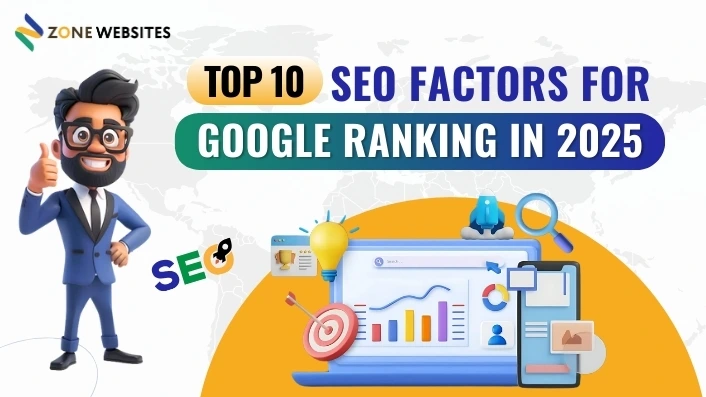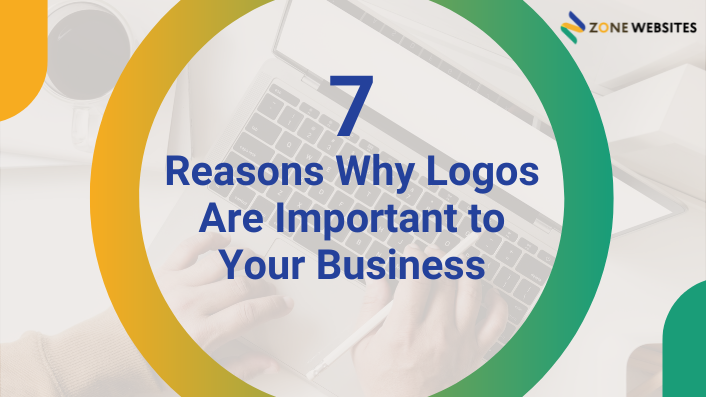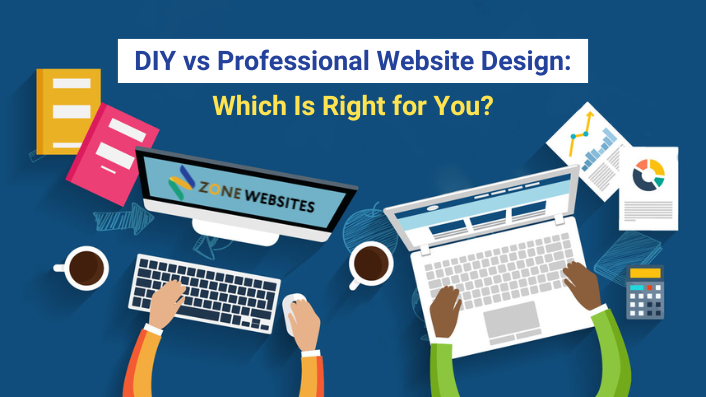Top 10 SEO Factors for Google Ranking in 2025: Updated List

Top 10 SEO Factors for Google Ranking in 2025: Updated List
Did you know there are more than 200 Google ranking factors? These factors are important for ranking higher in Google search results. While it is crucial not to ignore any or all of them, dealing with all of the 200 ranking factors can be difficult. To make it easier, in this blog, we will share with you some of the most important SEO factors for higher Google ranking.
Getting your website or page to rank higher on Google search results isn’t easy. Knowing what factors contribute to your higher Google ranking is important to your online success. Google constantly changes its rules, and you need to adapt to new standards quickly to stand out from the competition. By implementing these factors, your website is more likely to attract more visitors and convert those visits into leads or sales.
Today, we’ll discuss the Google ranking factors and the top 10 SEO factors for a higher Google ranking in 2025.
What are Google Ranking Factors?
To help you out, here we have shortlisted the top 10 SEO factors for Google ranking in 2025.
Top 10 SEO Factors for Google Ranking in 2025
Understanding the Google ranking factors can help you increase your SEO ranking on Google search results. Here are the top 10 SEO factors you should know.
1. E-E-A-T
The E-E-A-T, also known as Experience, Expertise, Authoritativeness, And Trustworthiness, serves as a benchmark for assessing content quality and reliability. In short, content provided by experts that answers the questions of your prospective customers. Google prioritizes content that is correct, reliable, and useful to users.
While E-E-A-T is not a direct SEO ranking factor in Google’s search algorithm, it is used as a set of guidelines to assess your website’s credibility and content quality. When your content is optimized for E-E-A-T, the chances of your website ranking at the top of Google search results increase significantly.
In this digital world where misleading information can spread quickly, Google uses E-E-A-T to ensure that users receive only informative and reliable content created by credible sources. Therefore, make sure your website is transparent about its authors, cites accurate information from reliable sources, and the content is correct and trusted by people.
2. High-Quality Content
As everyone knows, content is king. The quality of your content has a great impact on Google ranking factors. Google gives priority to content that’s original and valuable. If you create content that is unique, original, and helpful for users, Google will rank it higher on its search results. Make sure the content on your website is informative, engaging, AI-free, and not copied from other sources. Your content should provide value to the reader.
To maintain high-quality content on your website, you must keep the following factors in mind:
- Your content should be original, unique, and up-to-date.
- Ensure that each web page has a minimum of 500 words and that each blog has approx. 1000 words.
- Make sure the content is easy for the user to read and understand.
- Create content that is in-depth and covers a topic completely.
- Make sure all web pages and blogs are well organized and structured using multiple headings and subheadings (H1, H2, H3, H4, and so on).
Remember that the quality of your content is more important than the quantity. There is no point in having a web page or a blog of 2000 words with inaccurate information or copied content. So, if your content is high-quality, original, unique, and valuable for the user, then your website is likely to rank high in the search engine rankings.
3. Website Loading Speed
One of the most important Google ranking factors is page speed. Google made website loading speed as a part of its Core Web Vitals in 2021, making it a critical ranking factor. At the speed your website loads can make or break the user experience.
A fast-loading website enhances user experience and encourages them to stay on your site for a longer time exploring the content. On the other hand, a slow-loading website can lead to increased bounce rates, as users typically expect quick access to information. If your website takes too long to load, visitors will lose patience and leave your site. If you own an online business, reduced engagement can lead to lower conversions and overall sales.
So, it is very important to consider how quickly your website or pages load. Usually, Google wants your site to load fast to provide a great user experience for your visitors.
4. Mobile Friendliness
Around 60% of global website traffic comes from mobile, which makes it important to have a mobile-friendly website. Your website should be optimized for small screens like smartphones and tablets, as it is now a critical factor for higher Google ranking. Make sure your website is easy to navigate on mobile devices, with text that’s easily readable and links easy to click.
With more than half of searches on Google coming from mobile, it is important to ensure your website works well on mobile devices. Typically, mobile-friendly websites show up higher in Google search results. For many advertisers, a large number of traffic comes from people on their mobile phones.
A mobile-optimized website provides a good browsing experience to visitors by adapting to different screen sizes. If your site isn’t mobile-friendly, visitors are more likely to leave.
5. Backlinks
Backlinks, also called inbound links, are still one of the most important SEO factors for Google ranking. These are links that come from someone else’s site to your website. Backlinks are a crucial off-page SEO factor that helps boost your site’s authority and credibility. According to a report, more than 90 percent of pages get zero traffic from Google, often because they don’t have any backlinks.
Backlinks assist Google crawlers in finding your page for indexing. They are a vote of credibility from other websites, which indicates to Google that your content is useful, credible, and valuable. The more backlinks you have from high-authority domains, the more likely your site will rank well for top keywords in search engine results.
6. Domain Authority
Domain Authority or DA is a score that is calculated on a score from 0 to 100. It indicates how well your website will rank in search engine results. Domain authority is an SEO ranking metric that grades your website’s expertise on a specific topic and its ability to rank on Google. The higher the domain authority, the more the chance of ranking well on search engines.
There are several ways to boost domain authority, including creating quality content and getting high-quality backlinks. However, having a lot of backlinks doesn’t guarantee higher Google rankings. You will need to produce useful and informative content that’s focused on your industry and on topics that most appeal to your audience.
After this, Google will recognize you as an expert in your field, which will boost your domain authority and lead you to rank higher in the search results.
7. Search Intent and Content Relevancy
Search intent and content relevancy are crucial SEO factors for Google ranking. They directly impact how well your content matches a user’s search intent. The content needs to be highly relevant to what the user is looking for. Also, Google prioritizes pages that accurately match a user’s search intent, resulting in better search engine rankings.
When your content aligns with search intent, users are more likely to find what they need, leading to a positive experience and potentially increased engagement. So, create content that addresses the user’s need, whether it’s providing information, offering comparisons, or guiding them toward a purchase.
8. Website Security
The security of your website is also a critical Google ranking factor. In 2014, Google’s algorithms started using HTTPS as a ranking signal. HTTPS encrypts the data between your website and your user’s browser. So, make sure your website is using HTTPS encryption. This is important for protecting user data, including sensitive personal and financial information.
Websites without an SSL certificate may not rank well in Google search results. Secure websites are more likely to earn the trust of their users as they provide a better experience, which can lead to more conversions and improved Google rankings.
9. User Experience
User experience is another major SEO ranking factor that can significantly impact where your website ranks in Google search results. It ensures your site is designed to be easy for users to use. Google uses an artificial intelligence program called RankBrain to rank web pages. It uses various ranking signals like:
- CTR (click-through rate): The percentage of users who click on your site in the Google search results.
- Bounce Rate: The number of people who click on your page and leave quickly. As a result, Google judges that page as not relevant to users and decreases its rank.
- Dwell Time: This measures how long a visitor stays on your website. This indicates to Google that the user is getting relevant information and is finding your site helpful.
A webpage with well-structured content, clear calls-to-action (CTAs), and optimized metadata can boost your Google ranking. It provides a positive user experience and signals to Google that the page is relevant, informative, and easy to navigate, all contributing to better SEO ranking.
So, if you want to rank your website higher on Google search results, make sure it is user-friendly.
10. Keyword Optimization
Keyword optimization is a process that involves strategically adding keywords to your website or pages. It increases the chances of your website appearing higher in search engine results pages (SERPs) when people search for products or services like yours.
Keyword optimization helps attract more people to your website who are looking for what you offer. To do this, you will need to identify the keywords people are likely to use when searching online for information related to your business.
To make sure that your website or pages are keyword-optimized, here are a few key tips:
- Title Tags: Add the target keyword at the start of each post.
- Meta Description: Write perfect meta descriptions and make sure to add your focus keyword so users know what your page or post is about.
- Image Alt Text: Since search engines, such as Google, are unable to understand image files, you should use keywords that properly describe the image and are relevant to your content.
- Anchor Text: It helps search engines like Google understand what a page is about. Use anchor text with keywords that match the page you’re linking to.
- Avoid Keyword Stuffing: Don’t use your primary search term repeatedly. Including your primary search term multiple times is not an effective SEO practice. So, try to include your primary search term a few times and use different variations and secondary keywords.
- Use LSI Keywords: Use LSI or Latent Semantic Indexing keywords to improve the relevance and visibility of your content. This will also help Google understand varied search intents and improve content ranking. Additionally, you can use tools like Google Autocomplete to identify and generate LSI keywords.
- Include keywords in H2 and H3: Use keyword variations and LSI keywords in the H2 and H3 headings of your page to optimize your content.
- Add Keyword in URL: Include the relevant search term directly within the web address or URL of a page. For example, if your blog topic is “Benefits of SEO Optimized Websites,” the URL will be like www.designbyzonewebsites.com/benefits-of-seo-optimized-websites/
Conclusion
SEO has a massive impact on your website’s Google ranking. It helps your website rank high in Google search results, resulting in higher traffic to the site. In this blog, we have highlighted the top 10 SEO factors for Google ranking in 2025. Yes, there are definitely many more. However, if you successfully follow these SEO factors first, you will definitely see a major increase in the Google ranking of your website.
Thank you for reading this post, and we hope you liked it. Stay connected for more tips and guides to make the most of your website.













